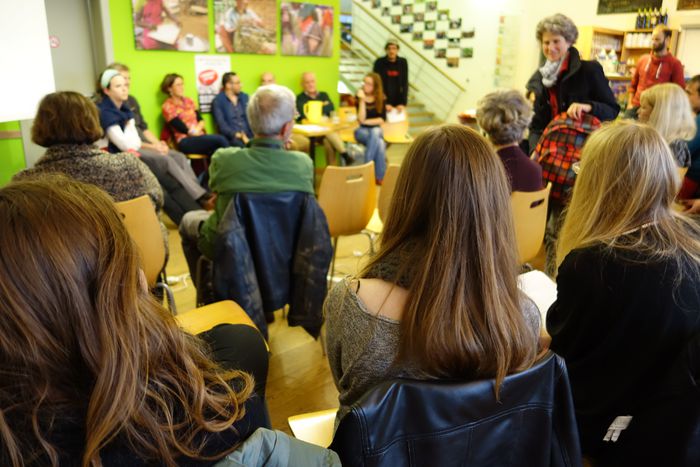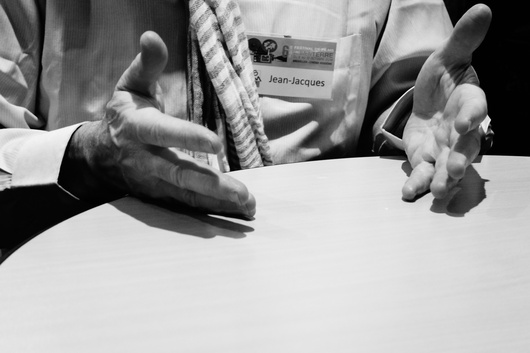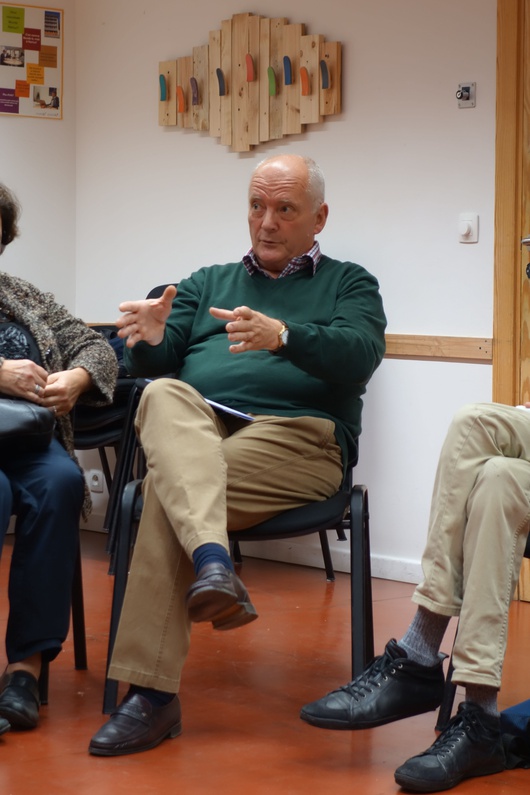
Feed the World Festival AlimenTerre : lending a hand to a civic initiative
Published on
Translation by:
Danica Jorden2014 was decreed the "International Year of Family Farming." As Europe continues to negotiate trade agreements destined to doom family farms to extinction, the Feed the World Festival "AlimenTerre" resonates in Bruxelles this weekend as an enormous call to order.
Film screenings, debates, discussion forums and even cooking classes … this year, once again, the team from Belgian NGO SOS Faim[1] (SOS Hunger) invites the public to learn about the complex stakes involved in world agriculture and food through a stimulating and creative series of activities. At the centre of their project is the idea of combating world hunger by defending family farms from the agro-industrial development model: "We think the goal is not to replace family farming with agro-industrial agriculture, but to expand family farming by giving them the means to invest. There is still an unimaginable potential for development there," explains Jean-Jacques Grodent, information director at SOS Faim.
 A true added value at the festival for the last two years, the Forum for Alternatives[2] provides the public with a space to mobilise and reflect together on new methods of production and consumption: "We wanted to be able to respond to the question that people ask us: "But what can we do?" We think that if we manage to expand farmers and local sourcing here, that will set in motion an expansion of farmers and local sourcing there (i.e. in the southern countries, editor's note), explains Maryse Williquet, who works for the Northern section of SOS Faim.
A true added value at the festival for the last two years, the Forum for Alternatives[2] provides the public with a space to mobilise and reflect together on new methods of production and consumption: "We wanted to be able to respond to the question that people ask us: "But what can we do?" We think that if we manage to expand farmers and local sourcing here, that will set in motion an expansion of farmers and local sourcing there (i.e. in the southern countries, editor's note), explains Maryse Williquet, who works for the Northern section of SOS Faim.
Planting as resistance
In this way, this year's forum welcomes five project makers who came to present their initiative about small farmers and local sourcing. Among them, José Veys, active at the non-profit "Les Jardins de Pomone" (Gardens of Pomona) rails vociferously against a system he terms harmful to health and the environment. The symbol of his resistance? The seed : "For us, it's essential, because it's a universal heritage: it's something that can't be taken away from us, it's not a commodity, and it can't be privatised as one is wont to do today. So we produce seeds. And many times, we're rebels, we're in violation of legal regulations, we say it. But we continue anyhow. " The rebel gardener invites everyone to come farm with him, however they can, to renew the broken link between the earth and our heritage, to retake control over our food and self-sufficiently respond to the laws of free trade.
 Speakers and the public were then invited to jointly discuss the viability and limits of these civic measures. Among the problems raised was the self-management process: how to manage and coordinate the work within a cooperative model when there are numerous participants? How can this type of initiative be made durable, and how can reliable networks be put in place and protected from commercial interference? José, for his part, would like associations and civic cooperatives to be considered temporary chains of public power, in the hope that they can take control of things. While the forum opens up perspectives on direct, local, daily action by citizens wishing to participate at home in a sustainable agricultural model, the festival is also aimed at providing information about the concerns of farmers' organisations in countries in the South, defending their position and priorities in the face of agricultural policies made by Belgian and European decision-makers. The films shown also deal with diverse issues, such as the consequences of land requisition by the major agri-business groups, or investment in humanitarian aide by the private sector .
Speakers and the public were then invited to jointly discuss the viability and limits of these civic measures. Among the problems raised was the self-management process: how to manage and coordinate the work within a cooperative model when there are numerous participants? How can this type of initiative be made durable, and how can reliable networks be put in place and protected from commercial interference? José, for his part, would like associations and civic cooperatives to be considered temporary chains of public power, in the hope that they can take control of things. While the forum opens up perspectives on direct, local, daily action by citizens wishing to participate at home in a sustainable agricultural model, the festival is also aimed at providing information about the concerns of farmers' organisations in countries in the South, defending their position and priorities in the face of agricultural policies made by Belgian and European decision-makers. The films shown also deal with diverse issues, such as the consequences of land requisition by the major agri-business groups, or investment in humanitarian aide by the private sector .
We leave the meetings stimulated and optimistic, which really flouts the feelings of powerlessness that often comes when faced with problems that seem too complex and far away. In a globalised world where local action could have repercussions on the other side of the planet, the increased power of civic gesture and engagement - and staying informed - must be appreciated.
To find out more:
TO READ ! Pablo Servigne: " Feeding Europe in Crisis : Towards resilient food production systems "
TO EAT ! A short practical guide on sustainable meals, édité par Simply Food.
LET'S MOBILISE! Come plant potatoes with the Patatistes!
LET'S LIVE DIFFERENTLY! The ecoiris, an alternative currency for your neighbourhood!
[1] Belgian NGO development cooperative for the fight against world hunger through supporting family farming. It works with local associations and farming collectives.
[2] An event co-organised by Quinoa, Oxfam-Magasins du Monde, Rencontre des Continents and SOS Faim.
Translated from Festival AlimenTerre : une main tendue à l'initiative citoyenne



